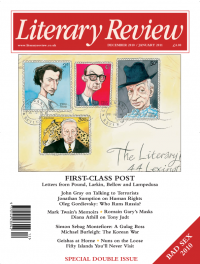Andrew Hussey
En Garde
Public Enemies
By Bernard-Henri Lévy and Michel Houellebecq
Atlantic Books 308pp £17.99
With the recent award of the Prix Goncourt for his latest novel La Carte et le territoire, Michel Houellebecq suddenly seems to have earned the right to be taken seriously. It’s been a long time coming. Houellebecq first came to international prominence in the late 1990s and early 2000s with a series of novels that expounded a gloomy worldview he calls ‘depressionism’, which sees futility and boredom in every human endeavour (except perhaps group sex, and even then the excitement is only fleeting). Meanwhile, over the past decade Houellebecq has become an established presence in the French media, known for his deliberate provocations, which have ranged from denouncing Islam to an apparent espousal of casual racism and misogyny. Now, after fifteen years as the arch-rebel of contemporary French letters, Houellebecq has become the mainstream. As a perennial outsider he is no doubt deeply disappointed by this turn of events, but it does force the reader to look a bit harder at his back catalogue.
This is especially true of Public Enemies, a public correspondence between Houellebecq and the ‘philosopher’ Bernard-Henri Lévy, which was an immediate bestseller on its publication in France in 2008. Lévy, or ‘BHL’ as he is known to the French public, cuts a clownish figure on the French media

Sign Up to our newsletter
Receive free articles, highlights from the archive, news, details of prizes, and much more.@Lit_Review
Follow Literary Review on Twitter
Twitter Feed
The era of dollar dominance might be coming to an end. But if not the dollar, which currency will be the backbone of the global economic system?
@HowardJDavies weighs up the alternatives.
Howard Davies - Greenbacks Down, First Editions Up
Howard Davies: Greenbacks Down, First Editions Up - Our Dollar, Your Problem: An Insider’s View of Seven Turbulent...
literaryreview.co.uk
Johannes Gutenberg cut corners at every turn when putting together his bible. How, then, did his creation achieve such renown?
@JosephHone_ investigates.
Joseph Hone - Start the Presses!
Joseph Hone: Start the Presses! - Johannes Gutenberg: A Biography in Books by Eric Marshall White
literaryreview.co.uk
Convinced of her own brilliance, Gertrude Stein wished to be ‘as popular as Gilbert and Sullivan’ and laboured tirelessly to ensure that her celebrity would outlive her.
@sophieolive examines the real Stein.
Sophie Oliver - The Once & Future Genius
Sophie Oliver: The Once & Future Genius - Gertrude Stein: An Afterlife by Francesca Wade
literaryreview.co.uk